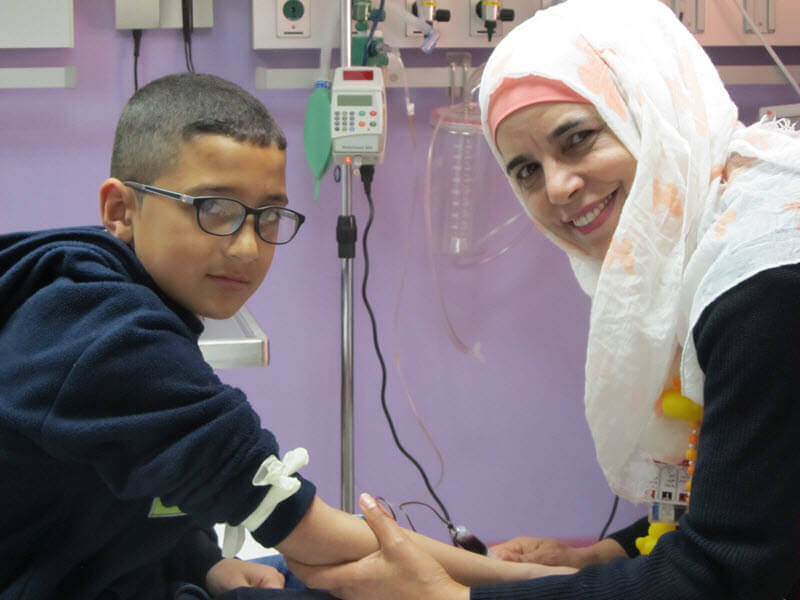Our team has travelled to Jerusalem to provide training and support to the amazing staff at Augusta Victoria Hospital. We have had a very full few days in the pediatric blood and cancer unit of in Augusta Victoria Hospital (AVH).
(AVH) is housed in a beautiful historical building that, at the time of its dedication as a hospice and rest home in 1910, was the most modern construction in Jerusalem and the first in the Holy Land to have electricity.
The hospital became a major medical facility in Jerusalem to care for Palestinian refugees after the 1948 war. The International Committee of the Red Cross first managed it and then, since May 1, 1950, by the Lutheran World Federation.

Our goal for this trip is to work with the nurses, nurse managers and doctors to help develop their practices and policies on the use of “Comfort Positions.” These positions incorporate the parent into the procedure and include other best practices for reducing stress for the child.
Comfort Positions were developed by Mary Barkey, CCLS and Barbara Stephens, CRRN and involve the use of siting and hugging positions rather than restraint. Parents are invited to hug/hold the child or at least be very close by while the procedure is being performed.
The staff at AVH is known for their kindness and compassion. So, adding Comfort Positions to their practice is a logical next step.
Many of the children we are seeing are having a blood sample taken or IV/Cannula inserted. Having blood drawn or starting an IV to receive medicine seems simple to an adult, but for a child, it is terrifying.
Most patients travel some distance with their parent or caregiver to receive care and the room is typically full of patients and parents. Most of these children have been undergoing treatment for a while – they know what’s coming. For many, it was scary last time, so why would it be different today?
When practiced this week at Augusta Victoria, we saw many children who sat in their mother’s lap while having blood drawn or an IV started. They were soothed and distracted from what was going on, and then praised and validated after the procedure for doing a good job.
Save a few children we have seen, all have been quite scared of needles. A 3-year-old boy had to go through the process three times, with no success as his veins collapsed. An older boy simply refused treatment. It took hours of coaxing from several staff to get him to try again, and even then it took five staff to start the line. Fortunately, it was performed using a Comfort Position. We were happy to be a part of the team effort with the nurses and social worker. And we were really happy to see him playing and laughing a short time later.
These instances are where the importance of our work really shines through. Here are some simple things we were able to implement or model to make Augusta Victoria an even happier place for kids in the future.
We modeled multiple Comfort Positions that are already being used.
A play area was set up and the kids and parents enjoyed coloring, books and puzzles.
Sensory distraction was provided and helped to calm and comfort kids during procedures.
Staff is preparing all the necessary tools before bringing the child patient into the treatment area. This lessens the time the child is stressed out and keeps them from seeing all of these scary and unknown items.
There is much more to be done. Our hope is to make the above improvements permanent habits and to teach a lot more before we come home. The pediatric unit at Augusta Victoria is full of caring, engaged and passionate staff, but they certainly have needs. Some needs are simple, like the need for coloring books, toys and other items to distract the child during procedures and make the overall visit less scary. Other needs are more complex, like ongoing staff training and more or renovated space. All of these needs can be met in some way through your support.

